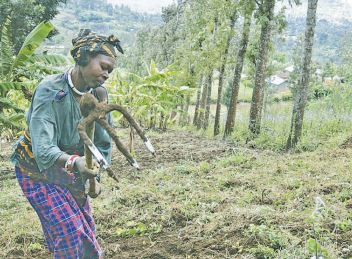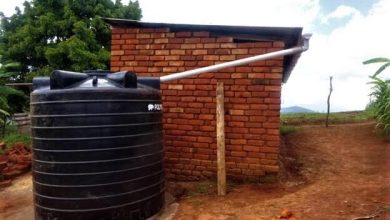Women’s Land Rights Manifesto: Tightening grip on ownership rights and secure tenure

DAR ES SALAAM: EFFORTS to promote women’s land rights made new gains recently with the declaration of the Women’s Land Rights Manifesto launched by the Stand for Her Land Tanzania (S4HL TZ) campaign on September 22, 2025 in Dar es Salaam.
Launch of the Manifesto comes six years after S4HL TZ campaign was established, with the goal of promoting equal ownership and secure land tenure for women.
The Manifesto signed by a coalition of 36 members comprising grassroots, national and international organisations working towards advancing women’s land rights, collectively addresses cultural norms to overcome societal barriers that prevent women from realising their land rights jointly, individually and communally.
It also promotes women’s use of land for economic benefits and advances women’s participation in land governance and decision-making processes.
“We believe that land is life. It is not merely a productive resource but the foundation for economic empowerment, food security, climate justice, gender equality and sustainable livelihood. It also gives women identity, social status and power,” says Khadija Mrisho, Land Tenure Expert at Landesa Tanzania, which is the secretariat organisation for S4HL TZ.
However the situation on the ground paints a different picture. Across the world, women are systematically denied equal rights to land due to discriminatory customary laws and inadequate implementation of legal provisions that safeguard women, among others.
In Tanzania the National Land Policy 2023 (Revised) which was launched in March this year creates room for women to participate in decision making process in all matters related to land rights and gives them the right to inherit land.
However stakeholders remain skeptical about implementation of the provisions given that experience shows there is a yawning gap between what is written and what is actually being done on the ground.
Differences between men and women still exists in accessing land, owning it and having secure tenure.
During the UN General Assembly in June 2023 UNWomen Executive Director Sima Sami Bahous said that for many people around the world, land represents power and identity.
“Women’s control over land is therefore fundamental to the achievement of gender equality and also the economic independence of women… We must break down barriers to women’s rights to land,” she urged.
The Manifesto thus calls for recognition, equality and justice in all matters relating to land rights especially ensuring that women have the right to not only access and own land but they must have the right to control, use it and make independent decisions about it.
“Compelling arguments are not enough. We want to see action that would translate these rights into practice and give meaning to gender equality, democracy, and sustainable development,” says Ms Mrisho.
Women form the largest group of small producers that feed countries, Tanzania included. With assured land ownership they can increase agricultural productivity, reduce vulnerability to all forms of land grabbing, and raise sustainable incomes.
The President of the 77th session of the United Nations Assembly, Csaba Kőrösi, said that when women farmers have access to own land, they grow more for their families and nations.
This has a positive effect on income and welfare of families. In her address during the session United Nations Deputy Secretary-General Amina Mohammed said, “We must finally recognise and value women as owners, managers of our lands and of our resources. Women make up the majority of rural farmers, but less than 15 percent of agricultural landholders are women, and their right to inherit property continues to be denied under customary and traditional laws in over 100 countries.”
The recently launched Manifesto is grounded on principles of non-discrimination and gender equality, unbiased implementation of laws, adherence to nonoppressive customs and traditions.
It also stands for appropriate reforms in relevant laws and policies and inclusive advocacy of women’s rights that takes all stakeholders on board.
“There are various issues at stake here. One is our demand for security of tenure. Our Manifesto demands that all women, regardless of marital status, age, ethnicity, location, disability, or socioeconomic background, must enjoy equal rights to own land. They must all be guaranteed secure and legally enforceable land tenure, whether they own, rent, inherit, or use the land individually, jointly, or communally,” says Christina Mfanga, Chairperson of Umoja wa Wanawake Wavuja Jasho Manzese (UWAWAMA).
“And we are talking about all women; not only those in urban centres, not only those who are educated and employed but the poor women who live in rural areas also need to be guaranteed secure tenure of the land they own,” she adds.
With insecure tenure, women have experienced displacements, evictions, and land grabs and it is appropriate that all those who are affected must be redressed.
The Manifesto also demands that women at all levels and socio-economic backgrounds must access affordable, timely and gender-sensitive legal aid services, land tribunals, and justice systems.
“Many women do know their rights, they don’t understand what the policy and laws have to offer for them in terms of protecting their right to own land and the guarantee to secure tenure. The manifesto demands capacity building for women and duty bearers to ensure women’s land rights are claimed, upheld, and protected,” says Rehema Mfaume, a resident of Kigamboni in Dar es Salaam and a member of theS4HL TZ coalition.
It thus calls for the government to reform legal and customary frameworks to ensure women have equal land rights with men and update information on land ownership, tenure security, and land-based conflicts to inform country plans, strategies, and empowerment programs.
There must also be established monitoring mechanisms to track progress toward gender equality in land access, ownership, use, and control. In order to meet this target, the government has to allocate resources and adequate budget to support legal reforms, women’s land ownership, and capacity building for local government authorities in charge of land governance.
“We also call upon communities to abolish traditions and customs that create huddles for women’s access to and ownership of land. Some traditions prohibit women from using land and deny them the right to use in a manner they deem fit. Such practices must be abolished,” says Martha Laurent, member Pastoral Women’s Council from Hanang District in Manyara Region.
The International Institute of Environment and Development (IIED) urges governments to take measures from time to time to ensure that the tenure rights of women producers are protected. The measures include recognising and upholding gender equality as a key principle governing all land tenure issues within the country and adopting explicit legal provisions protecting women’s equal rights to land, independent of marital status, and supporting their inheritance rights.
“Governments must also deem void any customary norm or practice that discriminates against women’s rights to own, control or inherit land. They must also provide adequate financial and technical resources to implement these measure,” reads part of one of IIED’s publication.
On the other hand the Manifesto demands that development partners, international organisations, and donors prioritise women’s land rights and provide resources, tools and technical support needed to advance women’s land rights. It also wants the private sector to respect and protect women’s land rights by abiding to the principles of free, prior, and informed consent when undertaking land-based investments.
“This manifesto tasks civil society organisations with responsibility to continue to organise, sensitise, and educate women. They also have the duty to capacitate women and communities and advocate for women’s land rights,” says Ms Mrisho.
Yet some of the demands made by Manifesto can be realised if women have the political will to change the situation. There have been cases where women have ganged up with their brothers to deny land ownership and secure tenure of the latter’s wife, a sad truth that women are ready to undermine the rights of their fellow women in order protect the interests of men.
Nevertheless men still hold the key to protect women’s land rights. “It really requires a change of mindset for men to realise that when women and girls own land and that ownership is adequately protected families can improve their lives socially and economically,” says Godfrey Massay, Executive Director of Landesa Tanzania.





